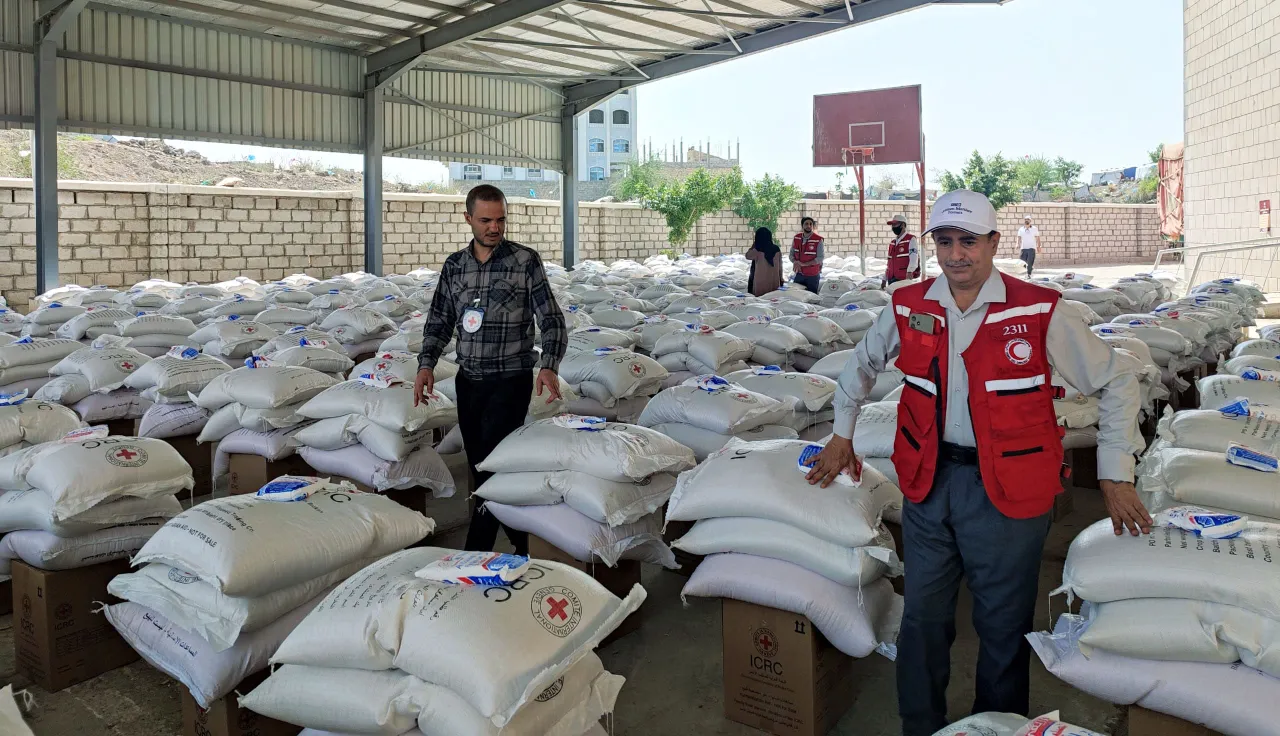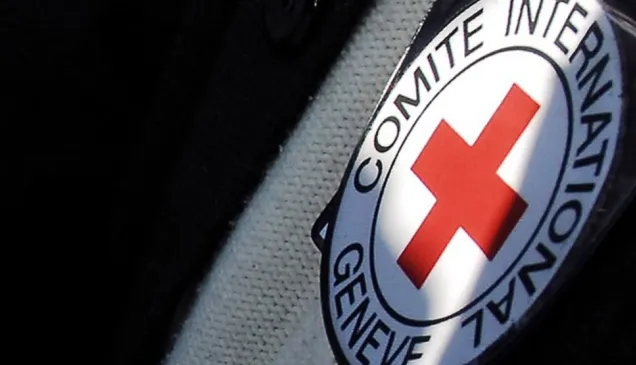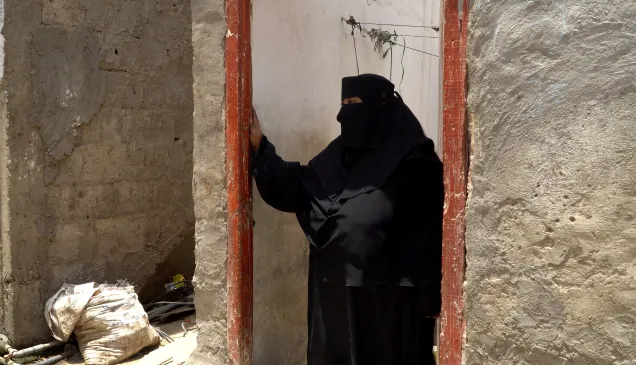Frequently asked questions about the ICRC’s work in Yemen

The ICRC has been in Yemen since 1962, providing aid in collaboration with the Yemen Red Crescent Society. We focus on projects improving health, water and sanitation in vulnerable communities; helping people to become financially independent; organizing the return of detainees; and clearing areas of explosive remnants of war. All services provided by the ICRC are free.
For more information, we invite you to visit our page about Yemen.
Frequently asked questions from people affected by the conflict
-
We acknowledge that the humanitarian situation has become very difficult for many people in Yemen, and the needs are vast and diverse. We try to respond to the most urgent, but due to limited means and resources, this is not enough to cover all the massive needs of the population.
Years of armed conflict, other violence and economic hardship have exhausted people's capacity to cope and driven all essential services nearly to the breaking point. The humanitarian situation is worsening, with 70% of the population reliant on humanitarian aid to survive, and more than 80% of them are living below the poverty line (2023 figures). Our priority remains to help the most affected communities.
-
The ICRC provides vital support to strengthen five governmental physical rehabilitation centers across the country, enhancing their ability to deliver quality services for people with disabilities from conflict-affected areas. This support includes the provision of materials and components, equipment, infrastructure improvements, and continued technical guidance.
Additionally, the ICRC plays a key role in building the capacity of the staff of these centers by offering specialized training in prosthetics and orthotics and physiotherapy, as well as in providing continuous mentoring and knowledge transfer to reinforce sustainable and high-standard rehabilitation services.
-
The ICRC’s role is purely humanitarian and, in this instance, is limited to supporting the logistical aspects of release operations to ensure safe and dignified release and repatriation. The ICRC provides one-off cash support to facilitate their onward journey home.
While the ICRC facilitates the release and transfer of detainees as a neutral intermediary, any responsibility for compensation would lie with States, not the ICRC.
We ensure individual follow-up with people in detention by helping them reconnect with their families. After former detainees are released, we contact them again to see how they reintegrate into life after detention. We direct them to service providers within our supported health care facilities or other specialized organizations where needed.
The ICRC can also issue Attestations of Detention, which, in addition to the official Release Document issued by detaining authorities, can enable detainees to access their salaries, pensions and public services.
-
The ICRC is not in place to determine who will be released or not. This is the responsibility of the authorities. The ICRC’s role is purely humanitarian and, in this instance, is limited to supporting the logistical aspects of this release operation to ensure safe and dignified release and repatriation.
If you have not been in contact with your relative, and if you have not submitted a tracing request, you can open a tracing request with the ICRC, and we will try to help you find out where the person is and restore contact.
-
Unfortunately, the ICRC does not have the capacity or resources to help individuals or groups leave Yemen or provide financial assistance for relocation. This is currently beyond our capacity. We are deeply sorry for the uncertainty you may be experiencing and regret that we cannot offer a better solution at this time.
-
The Yemen Red Crescent Society (YRCS) and the ICRC are members of the International Red Cross and Red Crescent Movement, the world's largest humanitarian network. The ICRC collaborates with the Yemen Red Crescent to provide humanitarian assistance to those affected by the conflict. Both organizations work hand in hand to respond to the most urgent needs of vulnerable communities in Yemen.
The ICRC supports the Yemen Red Crescent in strengthening the capacity of volunteers by providing the necessary training and equipment. These efforts include training volunteers in the areas of first aid, disaster management, and emergency response. They are also provided with necessary equipment such as ambulances and medical tools. Through this partnership, volunteers are able to provide the necessary support to those affected by conflicts and disasters, contributing to improving the humanitarian situation in the country.
-
We are very sorry for your missing relative; it must be very painful and distressing period for the family.
Families who have lost a loved one can contact ICRC offices in the areas where they live during working hours (8 am to 4:30 pm) via the following numbers: in Sana'a (717115963), in Aden (711700182), in Taiz (730500739), in Hodeidah (775512802) or the general number (739555425).
Important note:
The ICRC relies on information provided by parties to the conflict and the authorities. We compile inquiries and continue discussions with all parties to clarify the fate of individuals. This process may take time due to the complexity of the current situation.
We will contact you as soon as we have substantial information to share. We deeply understand how difficult it is to wait for news and regret any delays. Thank you for your patience and understanding. -
We understand how difficult the situation has become for many. While we are unable to support individual medical cases, the ICRC focuses on strengthening the healthcare system to benefit as many people as possible.
We support over 49 health facilities across Yemen, including primary healthcare centres. We also provide insulin for diabetic patients and regularly support five physical rehabilitation centres. We do our work in close collaboration with the Ministry of Health.
-
The ICRC responds to the pressing needs of the most affected populations across Yemen, including through its support for the Yemen Red Crescent Society (YRCS).
Given the limited resources and the enormous needs in Yemen, which has been impacted by armed conflict for the past 20 years, the ICRC prioritizes providing life-saving support to public institutions, such as health facilities and water and sanitation structures, as well as relief support to communities at or near the frontlines. Therefore, the ICRC cannot support the rebuilding of houses affected by the conflict in Yemen.
-
We understand how difficult the situation has become for many people. While we are unable to support individual medical cases, including psychological support, the ICRC focuses on strengthening the healthcare system to benefit as many people as possible.
We support over 49 health facilities across Yemen, including primary healthcare centres. We also provide insulin for diabetic patients and regularly support five mobility rehabilitation centres. We do our work in close collaboration with the Ministry of Health.
-
Currently, our capacity allows us to support a limited number of health-care facilities across Yemen, including primary health-care centers, based on priority needs.
-
The ICRC is not a political organization and has no power to stop wars. Our role is to help people affected by conflict and remind all sides to respect the rules of war and protect civilians.
-
If you are in Yemen, reach out to us by calling the ICRC Community Contact Centre at the toll-free number 8005544.
Working hours are Sunday to Thursday from 8 AM to 4 PM.
If you are outside Yemen, you can reach us through direct messages to the ICRC in Yemen's Facebook account or the ICRC Yemen account on X platform. You can also call us at +967 1 467873/4/0 or +967 1 213844.
Or you can send us an email at: san_sanaa@icrc.org.
-
All services provided by the ICRC are free.
Everyone who works with the ICRC (our staff, partners, and suppliers) must always treat you with respect and dignity.
It is forbidden for ICRC employees and our partners to ask for money or any type of favours in exchange for aid. We encourage all to report in good faith suspicion of fraud, corruption, sexual exploitation and abuse, sexual harassment and other suspected misconduct.
You have the right to report cases of inappropriate behaviour or illegal actions on the part of the ICRC. To do so, you can email us at code_of_conduct@icrc.org. You can also report it directly in the Integrity Line (available in English, French and Spanish).
The information you provide will remain confidential. Filing a complaint will not affect the ICRC's work in your community.
-
First and foremost, it is essential to emphasize that the ICRC is not a religious organization, and its emblem doesn’t have any religious connotations. The emblem's design is derived from the inverse of the Swiss flag. The red crescent and red cross emblems serve as visible symbols representing the protection guaranteed under the Geneva Conventions and their Additional Protocols. These emblems ensure the safety and well-being of relief workers, medical personnel, medical facilities, and medical transport amid armed conflicts.
-
ICRC is constantly monitoring how IHL is applied in situations of armed conflicts. As the guardian of IHL the ICRC takes measures to prevent suffering of victims of armed conflicts not only through direct assistance but also by promoting compliance with IHL. When the ICRC receives information about alleged violations of IHL we address the resulting humanitarian concerns directly with the parties to the conflict, i.e. those responsible for faithful application of IHL and repression of its violations.
These interactions are confidential, which allow us to be directly and frankly about all issues of concern. This practice is grounded in extensive experience accumulated in various contexts worldwide and has demonstrated that direct confidential dialogue can yield positive results. And by saying "positive results" we mean improvement of humanitarian situation and better protection of civilians and the victims of armed conflicts.
-
ICRC’s primary concern is to maintain its capacities and to respond swiftly to the wide-ranging humanitarian needs in Yemen. Depending on where the violence might escalate and whether infrastructure which is vital for the survival and well-being of the civilian population might be affected, we may better understand the effect on humanitarian operations. The ICRC urges everyone to ensure the space for principled humanitarian action in Yemen and to provide efficient humanitarian access to the affected civilians.
-
As part of its strictly humanitarian mandate, the ICRC visits different places of detention across the country to assess the conditions and treatment of detainees. The ICRC discusses its findings confidentially and bilaterally with the concerned authorities and provide our comments and recommendations directly to them, so that corrective action can be taken by the authorities if necessary.
In Yemen, as in any context, the ICRC does not comment publicly on the treatment of detainees.
According to Geneva conventions, anyone detained must be treated humanely and with dignity irrespective of their status.
-
The ICRC maintains a permanent and longstanding presence in Gaza and the Occupied Territories. Currently, the ICRC team in Gaza is actively engaged in a variety of humanitarian activities across different fields. These include providing support to health facilities, distributing food and shelter items, and ensuring access to clean water. Additionally, the ICRC is working in collaboration with its local partner, Palestine Red Crescent Society, which plays a crucial role in responding to the urgent needs in Gaza. For more detailed information on the ICRC's response and activities in Gaza, we can connect you with our spokesperson in Gaza, if necessary.
International Humanitarian Law in Yemen
-
The ICRC works to raise awareness about the impact of armed conflicts on civilians, advocate for the rights and protection of vulnerable people, and foster respect for international humanitarian law among states, armed groups and other relevant actors.
The ICRC does not have the power to directly enforce International Humanitarian Law (IHL) in the way a legal system does. It acts as a guardian of IHL, promoting and working towards its application through dialogue and persuasion. This includes:
- Monitoring and reporting on violations of IHL.
- Dialogue with parties to armed conflict to promote compliance.
- Disseminating knowledge of IHL.
To know more, visit the article Frequently Asked Questions: Rules of Law
Other useful information
-
Show your support for the ICRC by using your voice to share accurate information about our work with your community, whether in person or online.
We are committed to transparency about our actions and limitations. Our mission is to protect the lives and dignity of those affected by armed conflict and violence while providing them with essential assistance. Your public support plays a vital role in helping us achieve this mission.
-
If you come across content online that you believe to be false or misleading, you can report it directly to the social media platform.
You can also help slow the spread of misinformation by checking the veracity of questionable information before sharing it with others. -
The ICRC’s role as a strictly neutral humanitarian organization puts us at the frontlines of modern conflicts and war zones, with our life-saving operations in over 100 countries.
While our commitment to neutrality and impartiality is not always understood, especially in emotionally charged situations, these principles are essential. They enable us to operate in even the most challenging contexts and ensure that our humanitarian mission reaches those who need it most.



